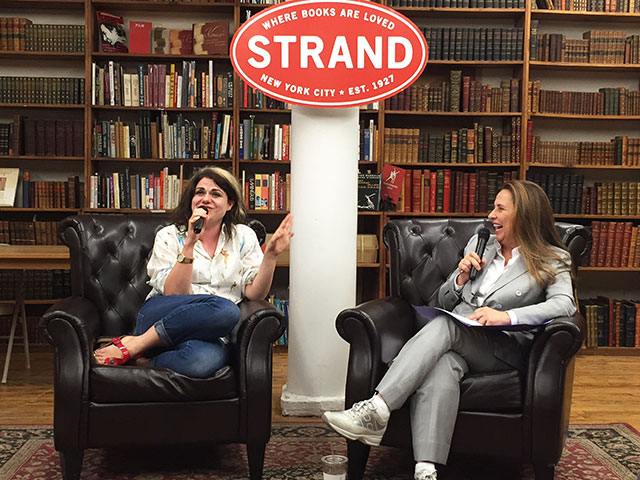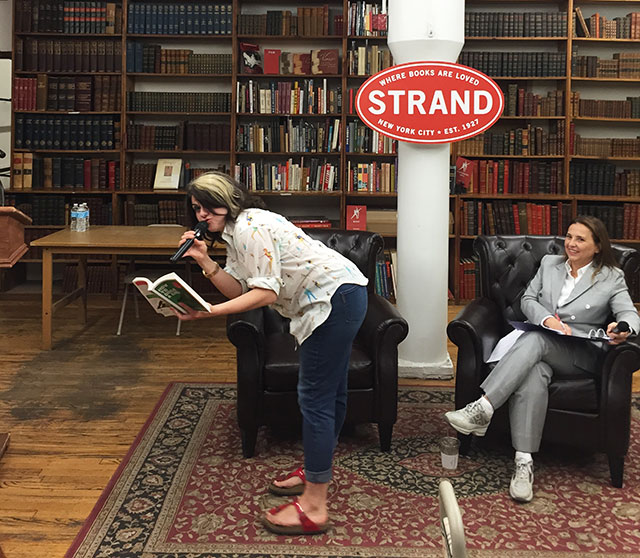
Caitlin Moran started her career as a teenage music journalist, much like Johanna Morrigan, the protagonist and narrator of Moran’s novel How to Build a Girl. The wildly funny book is now in paperback and Moran is reading around the United States. Moran, a British author, was at The Strand with editor Judith Regan to discuss the book.
The first thing Moran does is point out that the book contains legal jargon making clear it is a fictitious novel, not an autobiography, no matter how closely it resembles her own life. She draws a comparison to Laura Ingalls Wilder who wrote from an amalgamation of experiences. “A lot of the individual penises in the book didn’t happen to me,” Moran explains, saying she combined experiences of many people.
That doesn’t mean Moran didn’t have a lot of sex. She did. “There is something very hopeful about a penis,” she says. She adds that they are a lot like puppies begging for attention. Its the sort of thing that needs to be played with or put outside.
Regan, steering the conversation away from penises, asks Moran if she notices many differences between the United States and the United Kingdom. While this might have offered a perfect opportunity to insert a circumcision joke, Moran instead leads to a more serious comment: the United States is a country built on genocide. She describes race relations as like a huge lake of methane that seeps up and ignites. That isn’t to say the United Kingdom is innocent. “We did a whole heap of bad shit, but we did it in other countries,” she says.
On a lighter note, she says that the United States has far superior margaritas. In the UK, a margarita is simply vodka with lemons.
Much of Johanna Morrigan’s narrative is about navigating the challenges of poverty. Moran grew up poor, and that is reflected in the novel. Now she says her children have grown up with a lot more privilege than she ever had. She literally grew up without a bed sleeping on a shared floor mat.
The working class poor are often denigrated, she says and the state does pay for many services they use: the library, health care, dental care, the court system. As a child of working class poor, she benefitted from these services. Now, as an adult, she works and is solidly middle-class, having paid back back that investment and more through taxes. The benefit of the welfare state, she explains, is that children are not punished for the mistakes of their parents.
Moran’s father grew up in a time before the welfare state was built. He knew of many of the horrors where the British councils determined if people were poor enough or worthy enough for charity care. “You had to audition as a worthy poor person,” Moran explains.
Everyone ends up gaming the system–any system–she says. And while the middle-class are often complaining about the working class abusing the welfare system, in the UK, the working poor abuse benefits much less than the middle-class cheat the tax system.
One problem facing the United Kingdom today is having an economy fueled by Russian and Chinese investors. Most people are now earning less per year than their houses are as the property appreciates at a rapid rate. That hurts both the working and middle-classes.
Growing up working class, Moran was taught to dislike the wealthy. She was taught to assume they were all tory scum. She claims that isn’t useful. Now she has gone around a met some of those people and says some of them are lovely–they just happen to be clueless. The tory scum just don’t understand what it is like to be poor.
“You’re gradually going backward when you’re poor,” she says. But that does have some benefits. “Poor people are cleverer than rich people,” she adds. For instance, when she was poor, if something in the house broke, her father would have to figure out how to fix it or install a new thing. They would have to figure out how to read an ad for a used replacement, figure out how to ride the bus to go purchase it, and then come up and figure out how to get it working. Now, even as a middle-class person, Moran says she simply calls someone to fix things.

Moran describes herself at thirteen or fourteen-years-old as self-loathing, poor, and fat. The only thing she could do to make herself pretty was growing out her hair long because it was cheap. So one day she was lying on her bed and asked herself what kind of person would she need to be to love herself. All the things she loved were hanging on her wall over her bed: posters of people, of a dress she wanted, the kind of dress that someone might her if she was wearing. She co-opted elements of all these things and built a new identity for herself.
After creating her new identity, Moran went to London and had a lot of sex. This parallels what Johanna does. Moran says she was infuriated by the depiction of sex in Fifty Shades of Grey. She wanted to write a novel about sex in teenage years so that women would have a better understanding of that means: sex in the teenage years is going to be pretty terrible.
There are two kinds of things that young people experience: amazing experiences and terrible experiences that will later make nice anecdotes to tell friends at the pub. The only thing you might regret, she says, is cutting a fringe (bangs), because it takes a long time to grow back. She learned everything about sex from library books. It was pre-internet. She wanted to write something better.
“You could live a thousand lives if you could a thousand really good books,” she says.
Caitlin Moran and Judith Regan
Tuesday, July 7, 2015
The Strand